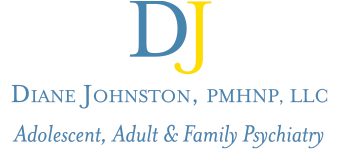In her private practice, Psychiatric Nurse Practitioner Diane Johnston specializes in family, adolescent, and adult psychotherapy and psychiatry. She provides her clients with comprehensive, mind/body mental health therapy and psychiatric medical care. Diane frequently collaborates with other therapists to provide evaluations, diagnosis, and psychiatric medications.
Diane is skilled in multiple mental health therapeutic modalities, including cognitive behavioral therapy, EMDR, mindfulness, and meditation. In addition, as a medical professional she can prescribe medications, conduct evaluations, create a care plan, and make medical referrals.
Diane makes every effort to be available to schedule appointments promptly. Her evaluation and assessment is comprehensive, and she provides complete, personalized follow-up care. She offers a no interest payment plan, and accepts some insurances. For more information and to schedule an appointment for consultation, psychotherapy, or psychopharmacology, please call (917) 952-2572 or email at diane@dianejohnstonpnp.com.
Diane Johnston on What is a Nurse Practitioner?:
I am a Psychiatric Nurse Practitioner, but many people don’t know what that means. For example, many are surprised to hear that I prescribe medications. A statement I frequently hear is ‘Wow, I had no idea you can prescribe! I thought only doctors do that.
In my practice, I often see patients for initial evaluations in order to determine if medication is appropriate. Often, patients are referred to me by other mental health professionals but are also referred to me by other patients with whom I have worked.
Psychiatrists are medical doctors who decide to specialize in psychiatry, and although medical education is changing, the focus has been primarily on the disease and illness medical model rather than on a model of health.
Psychotherapy is typically handled by other mental health professionals, including social workers, nurse practitioners, marriage and family therapists, and psychologists.
So, I would like to explain more about my profession. In terms of education, a nurse practitioner has graduated from a Master’s program in Nursing. I received my degree from Columbia University and then went on to do post-graduate training in Family Therapy and Mind Body Medicine. I also completed a Fellowship in Pain and Palliative Care at Memorial Sloan-Kettering Cancer Center.
How does a psychiatric nurse practitioner differ from a psychiatrist? To begin with, our education and training are somewhat different. In nursing education, health is stressed rather than illness. Everything that has an impact on someone is important to the nurse practitioner.
What can a psychiatric nurse practitioner offer someone who is seeking help? The answer is comprehensive care that takes into account all aspects of the person’s life.
Nurse practitioners are called ‘mid-level practitioners’. That means that we don’t function as doctors or nurses. Many psychiatric nurse practitioners like myself establish private practices where we see patients for psychotherapy as well as medication management.
A person’s living environment, relationships (or lack of relationships), health habits, genetic history, family influences, financial status, and job-related and personal stresses are all taken into consideration when an evaluation or assessment is done. All of these factors contribute to a person’s well-being or lack of well-being.
Psychiatrists in the 21st century mostly function as psychopharmacologists; a patient comes to them specifically for medication, and in a short 15-minute follow-up visit, the patient’s medications are the sole focus of the visit.
When seeking the help of a psychiatric nurse practitioner or a Psychiatric APRN (advanced practice nurse in psychiatry), inquire about whether the practitioner is board-certified. Board certification means that the individual has passed a certification exam that tests for competency and thorough understanding of psychiatry and psychiatric care

